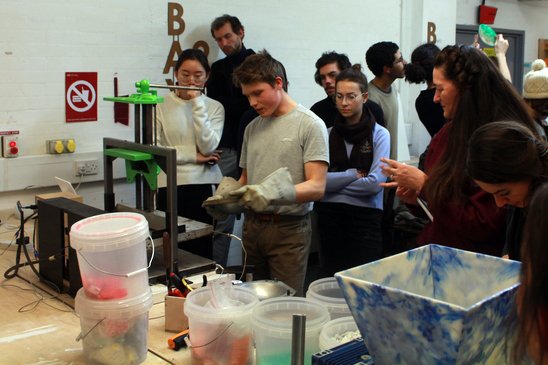Melt-It DIY

The Melt-It DIY event was a student driven project, held as part of UAL Green Week 2018, promoting sustainability through the process of recycling and designing with plastic waste. It featured three key speakers: Rodrigo Garcia with Ooho Project; Sophie Thomas on the circular economy and Happenstance Workshop with the STEW project.
The event was conceived, researched and created by BA (Hons) Graphic & Media Design student Carina Figueiredo, with the help of LCC 3D Workshop technician Andrew Davidson.
This was a self-initiated project, part of Carina’s Diploma in Professional Studies year. Carina had no previous knowledge of plastic substrates or extrusion machines. She taught herself the components, risks and temperatures associated with different types of plastics. It was a ‘project in development’ that sought to get students involved in the collection and processing of plastic waste at LCC, turning it into filament for 3D printing.
Carina invited Happenstance to take part as experts in the field. They are a materials design and manufacturing company making beautiful objects from waste materials. Their mission is to change people’s perceptions around waste via innovation – to use art and technology to unlock the hidden potential in recycling, and reveal the unexpected beauty of scrap. In doing so, they hope to inspire more people about sustainability and recycling.
Carina created handmade bins that were deposited around LCC to collect plastic bottles. Once collected, Happenstance demonstrated how participants could create their own bowls made out of these materials. Happenstance recycles plastics to create objects that fit to a closed loop cycle, called STEW products. Each object made is guaranteed for life and returnable for re-moulding at the end of its use.
The aim of Melt-it was to educate students and academics about their responsibility as both designers and consumers. For example, in the canteen at LCC we often do not give enough thought to the packaging materials we are purchasing and the project sought to new make connections between individual consumption and production.
“Responsible design means not only being aware, but acting every day to ensure that you have the least detrimental impact possible on the planet. I think about everything I do now as a human being and a designer.”
Carina Figueiredo, Graphic & Media Design student
During the workshop, participants were able to see the whole STEW process, from shredding to moulding. Visitors were also introduced to a whole spectrum of topics around small batch recycling, witnessing what a closed-loop systems is, why they are important and how they can be achieved.
http://blogs.arts.ac.uk/london-college-of-communication/2018/02/28/in-pictures-melt-it-diy/
